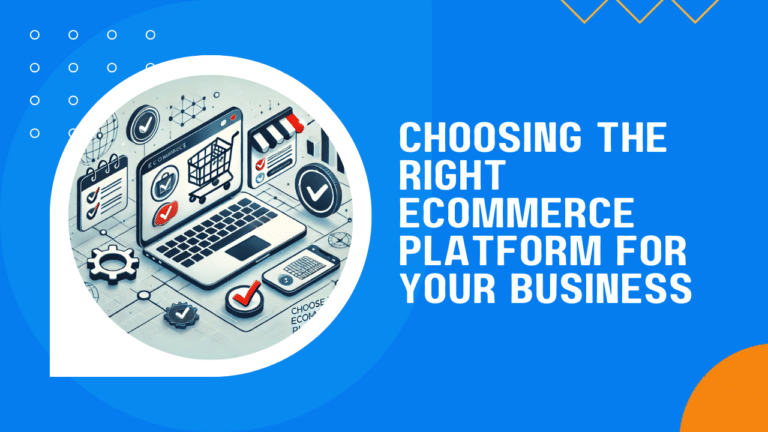Choosing the right ecommerce platform is critical to the success of any online business. The platform you select not only shapes the customer experience but also influences your operational efficiency, scalability, and overall profitability. This guide compares three leading platforms—Shopify, WooCommerce, and BigCommerce—to help you identify the best fit for your business. By evaluating key factors like ease of use, pricing, scalability, and customization, you can make an informed decision tailored to your unique goals and requirements.
Key Factors to Consider When Choosing an Ecommerce Platform
Selecting the right ecommerce platform involves assessing several critical factors. These considerations ensure your choice aligns with your business needs, budget, and long-term growth plans. Here are the key factors to evaluate:
1. Ease of Use
A user-friendly interface is essential, especially for business owners with limited technical expertise. Look for platforms offering intuitive navigation, straightforward setup processes, and accessible tools. For example:
- Shopify: Known for its drag-and-drop functionality and beginner-friendly design.
- WooCommerce: Requires familiarity with WordPress, making it better suited for those with technical skills.
- BigCommerce: Balances ease of use with powerful built-in features, though its learning curve is slightly steeper than Shopify’s.
2. Scalability
Your platform should support your growth without compromising performance. Assess how well it can handle increased traffic, a growing product catalog, and higher sales volumes:
- Shopify: Offers scalable plans, from startups to enterprise-level businesses.
- WooCommerce: Scales effectively with the right hosting provider, though it may require additional maintenance as you grow.
- BigCommerce: Designed for scalability, with robust features to manage large inventories and multi-channel sales.
3. Customization and Flexibility
The ability to tailor your store’s design and functionality is vital for creating a unique brand identity. Compare customization options:
- Shopify: Provides a wide range of themes and apps but has some limitations in backend customization.
- WooCommerce: Highly flexible due to its open-source nature, allowing complete control over design and functionality.
- BigCommerce: Offers robust customization options with built-in features, reducing reliance on third-party apps.
4. Pricing and Total Cost of Ownership
Analyze both upfront and ongoing costs, including subscription fees, transaction fees, and the cost of add-ons like plugins or themes:
- Shopify: Charges a monthly subscription with additional costs for apps and themes.
- WooCommerce: Offers a free core plugin but requires expenses for hosting, domain, and premium themes/extensions.
- BigCommerce: Provides flat-rate monthly plans with built-in features, potentially lowering the need for extra expenses.
5. Support and Resources
Reliable customer support and educational resources are crucial for troubleshooting and optimizing your store:
- Shopify: Offers 24/7 support, extensive documentation, and a large community forum.
- WooCommerce: Relies on WordPress community support and third-party developers for assistance.
- BigCommerce: Provides 24/7 support with a focus on helping businesses grow and succeed.
By carefully evaluating these factors, you can select an ecommerce platform that matches your business’s current needs and supports its future ambitions.
Overview of Leading Ecommerce Platforms
Understanding the strengths and features of the top ecommerce platforms is essential for choosing the right one for your business. Here’s an overview of Shopify, WooCommerce, and BigCommerce—three of the most popular platforms available today.
1. Shopify
Shopify is a fully hosted, all-in-one ecommerce solution that caters to businesses of all sizes.
Key Features:
- User-Friendly Interface: Its intuitive drag-and-drop store builder makes setup simple for beginners.
- Extensive App Store: Access hundreds of apps for enhancing functionality, from marketing tools to inventory management.
- Professional Templates: Choose from a wide variety of sleek, mobile-friendly themes to match your brand identity.
- Built-In Hosting: Shopify eliminates the need for separate hosting, ensuring reliable uptime and site speed.
Ideal For: Entrepreneurs seeking a hassle-free, managed solution with minimal technical requirements.
2. WooCommerce
WooCommerce is an open-source WordPress plugin that turns a WordPress site into a fully functional online store.
Key Features:
- High Customization: Its open-source nature allows complete control over design, functionality, and integrations.
- Cost-Effective Core: The plugin is free, with optional paid themes and extensions available.
- Extensive WordPress Integration: Leverage the power of WordPress’s SEO capabilities and a vast library of plugins.
- Flexibility: Suitable for small startups to large enterprises, provided they have the technical expertise or resources for management.
Ideal For: Businesses needing extensive customization and those familiar with WordPress.
3. BigCommerce
BigCommerce is a hosted platform designed for growing businesses that require robust built-in features.
Key Features:
- Scalability: Supports large product catalogs and handles high traffic effortlessly.
- Built-In Tools: Includes features like SEO optimization, marketing tools, and multi-channel selling without relying heavily on third-party apps.
- No Transaction Fees: Unlike many competitors, BigCommerce does not charge transaction fees, even on its lowest-tier plans.
- Multi-Channel Selling: Easily integrate with platforms like Amazon, eBay, and social media marketplaces.
Ideal For: Businesses anticipating rapid growth and needing a platform with enterprise-level capabilities.
Comparison Summary
- Ease of Use: Shopify leads with its simplicity; WooCommerce and BigCommerce cater to those with more technical skills or specific needs.
- Customization: WooCommerce excels due to its open-source design, while BigCommerce offers robust built-in options and Shopify strikes a balance.
- Pricing: Shopify and BigCommerce charge monthly fees, while WooCommerce allows flexibility in managing costs.
These platforms offer unique advantages that cater to different business needs. Understanding their features ensures you select one that aligns with your goals and capabilities.
Comparative Analysis
A side-by-side comparison of Shopify, WooCommerce, and BigCommerce helps identify the best ecommerce platform based on specific business needs. Here’s a detailed breakdown of how these platforms perform across key criteria:
1. Ease of Use
- Shopify: Designed for simplicity, Shopify’s intuitive interface enables users to set up a store quickly, even without technical expertise. It’s a top choice for beginners seeking an out-of-the-box solution.
- WooCommerce: Requires familiarity with WordPress, making it less user-friendly for those without prior experience. However, its flexibility appeals to technically skilled users.
- BigCommerce: Balances user-friendliness and robust features. While setup is straightforward, it has a steeper learning curve than Shopify due to its advanced tools.
Winner: Shopify for simplicity, though BigCommerce offers more powerful built-in features for slightly advanced users.
2. Pricing
- Shopify: Charges a monthly subscription starting at $39, plus transaction fees unless Shopify Payments is used. Additional apps can increase costs.
- WooCommerce: Free to use, but hosting, domain registration, and premium plugins/themes can add to expenses. Total costs vary depending on customization and hosting quality.
- BigCommerce: Offers flat-rate monthly pricing starting at $29.95 with built-in features, reducing the need for third-party tools. Importantly, there are no transaction fees.
Winner: WooCommerce for cost control, though BigCommerce’s predictable pricing appeals to growing businesses.
3. Scalability
- Shopify: Supports businesses of all sizes with scalable plans and robust infrastructure to handle traffic surges.
- WooCommerce: Highly scalable with appropriate hosting, but requires more technical expertise to maintain performance as the business grows.
- BigCommerce: Built for scalability, BigCommerce handles large product catalogs and high traffic seamlessly, making it ideal for rapidly growing enterprises.
Winner: BigCommerce for enterprise-level scalability, though Shopify is a close second for growing small to medium-sized businesses.
4. Customization
- Shopify: Offers extensive customization options via themes and apps. However, it has some limitations for backend customization compared to open-source platforms.
- WooCommerce: Highly customizable due to its open-source nature. Users can tailor every aspect of their store, but this requires technical skills.
- BigCommerce: Provides a wide range of customization options with built-in tools and fewer dependencies on third-party apps.
Winner: WooCommerce for its limitless customization potential, though BigCommerce’s built-in features simplify complex customizations.
5. Support
- Shopify: Provides 24/7 customer support via chat, email, and phone, along with extensive documentation and an active community.
- WooCommerce: Relies on community forums and WordPress documentation. Support quality depends on hosting providers or third-party developers.
- BigCommerce: Offers 24/7 customer support tailored to help businesses scale, along with detailed guides and resources.
Winner: Shopify for its accessible and comprehensive support, though BigCommerce also excels in guiding users toward growth.
Summary Table
| Feature | Shopify | WooCommerce | BigCommerce |
| Ease of Use | Intuitive for beginners | Requires WordPress skills | Balances ease and features |
| Pricing | Subscription + app costs | Free plugin; hosting needed | Flat-rate plans, no fees |
| Scalability | Suitable for all business sizes | Highly scalable with hosting | Built for growth |
| Customization | Extensive but limited backend | Highly flexible | Robust built-in tools |
| Support | 24/7 comprehensive support | Community-based | 24/7 with scaling focus |
This comparison highlights the strengths and trade-offs of each platform, allowing you to weigh your priorities and choose the platform that best supports your business goals.
Making the Final Choice: Selecting Your Ideal Ecommerce Platform
Choosing the right ecommerce platform is a pivotal decision that shapes the future of your online business. Shopify, WooCommerce, and BigCommerce each offer unique advantages tailored to different needs and levels of expertise.
- Shopify is ideal for those seeking a straightforward, all-in-one solution with minimal technical requirements.
- WooCommerce stands out for its unmatched flexibility and customization, making it a great fit for businesses familiar with WordPress.
- BigCommerce excels in scalability and built-in features, catering to businesses anticipating significant growth and complexity.
When making your decision, assess your business requirements, technical skills, budget, and growth goals. Consider factors such as ease of use, pricing, scalability, customization, and support to ensure your platform aligns with your long-term vision. With the right platform in place, you’ll set the foundation for a thriving ecommerce venture.









